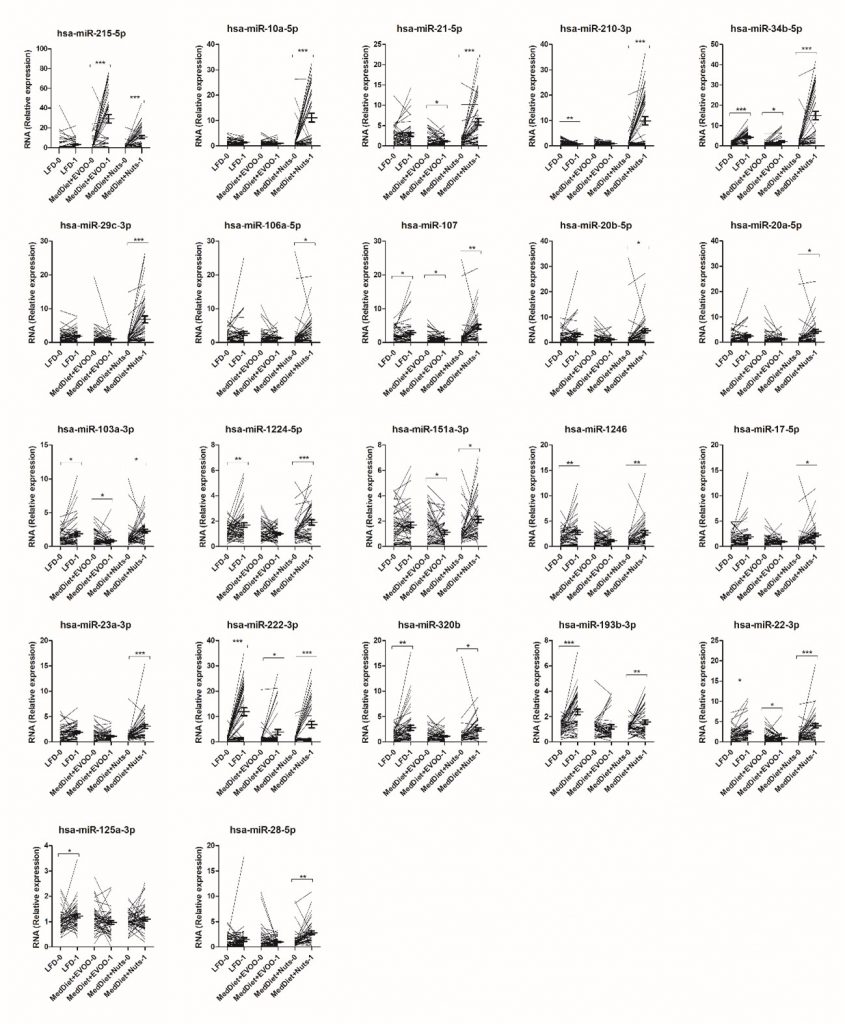By Diana Escalante and Alberto Dávalos
To maintain a healthy lifestyle, it is essential to maintain a balanced diet and to practice some type of physical activity. Both factors are determinants in the health-disease relationship, as for example in cardiovascular disease. Among the different diets described, we can highlight the Mediterranean diet (MedDiet) and its positive effects on cardiovascular risk factors, such as body mass index, waist circumference, blood lipids, blood pressure, inflammatory markers and adhesion molecules. Therefore, it is necessary to investigate and better understand the molecular mechanisms involved in the positive effects of this diet, for example epigenetic factors such as the modulation of microRNAs (miRNAs) through certain dietary patterns.
MiRNAs are small-length (18-22 nucleotides) single-stranded RNA molecules involved in most biological processes. In particular, they are involved in the regulation of gene expression and have been found to be dysregulated in several diseases, including cardiovascular diseases.
Previous studies performed by our group and other research groups have shown that miRNAs can be modulated by bioactive compounds in the diet. However, the role of exosomes in the transport of diet-modulated circulating miRNAs is still unknown. Exosomes are extracellular vesicles that can be actively released from a cell and directed to another cell. Therefore, exosomes have a relevant role in intercellular communication, in addition to transporting nucleic acids (mRNAs and miRNAs), proteins, carbohydrates, enzymes and other types of molecules. On the other hand, there are studies that suggest the possibility of modulating exosome secretion using food components, which could lead to the development of new dietary strategies with therapeutic potential for chronic diseases. In this context, in the present study, we evaluated the transport of RNAs in exosomes and their possible modulation by different nutritional interventions, such as MedDiet. The analyses included the collection of plasma samples of PREDIMED study (PREvención con DIeta MEDiterránea) at baseline and after 1 year of dietary interventions, which included three experimental groups: the MedDiet plus a supplementation with extra virgin olive oil (EVOO) or nuts (Nuts) and a low fat diet (LFD) group. The miRNAs transported by exosomes after consumption of diet were identified and validated using RT-qPCR (Figure 1).

The analyses performed on miRNAs transported by exosomes indicate that 22 c-miRNAs showed a change in their expression due to some of the diets studied (miR-215-5p, miR-10a-5p, miR-21-5p, miR-210-3p, miR-210-3p, miR-34b-5p, miR-29c-3p, miR-106a-5p, miR-107, miR-20b-5p, miR-20a-5p, miR-103a-3p, miR-1224-5p, miR-151a-3p, hsa-miR-1246, miR-17-5p, miR-23a-3p, miR-222-3p, miR-320b, miR-193b-3p, miR-22-3p, miR-125a-3p and miR-28-5p) Figure 2.

In general, it was observed that a MedDiet+EVOO or MedDiet+EVOO can modulate c-miRNAs (hsa-miR-215-5p, hsa-miR-10a-5p, hsa-miR-21-5p, hsa-miR-29c-3p and hsa-miR-23a-3p) with target genes involved in biological pathways related to PI3K-Akt signaling pathway, HIF-1 signaling pathway, insulin resistance and different pathways in cancer. However, whether miRNAs modulated through their target genes partly explain the beneficial effects of MedDiet and its incidence in reducing diabetes and some cancers, or increasing insulin sensitivity, remains to be further investigated.
Understanding the mechanisms that regulate the expression of non-coding RNAs, such as miRNAs, through dietary patterns may provide the basis for new therapeutic tools to treat metabolic diseases. The present study has shown that dietary components, specifically the MedDiet, exert an effect on the expression of non-coding RNAs transported by exosomes.
For more information of this research study, visit: https://link.springer.com/article/10.1007/s00394-021-02594-0

Alberto Dávalos 
Diana Escalante 
Dr. Alberto Dávalos holds a degree in Pharmacy and Biochemistry by San Marcos University (Lima) and a PhD in Pharmacy by Universidad Complutense de Madrid (Madrid). He has conducted postdoctoral research at the Hospital Ramón y Cajal (Madrid), at Yale University School of Medicine, (New Haven), and at New York University School of Medicine (New York). The research program of Dr. Dávalos focuses in identifying and characterizing new noncoding RNAs (miRNAs, lncRNAs and other type of regulatory RNAs) that regulate lipid metabolism and the effects of minor dietary components (micronutrients) on their expression.
Noncoding RNAs have been recognized as critical modulators of cardiovascular system in health and disease. He hopes to: (i) identify new therapeutic strategies through modulating noncoding RNAs levels by the diet or other lifestyle factors to treat dyslipidemia and to prevent atherosclerosis and cardiovascular diseases; and (ii) understand lifestyle modification of the epigenome and personalize the health of individuals using epigenetics (particularly noncoding RNAs) for the development of Precision Nutrition.
Email: alberto.davalos@imdea.org
Diana Carolina Mantilla Escalante is a PhD student in Food Sciences at the Universidad Autónoma de Madrid (Spain) in Food Sciences. In 2013 she obtained her degree in Food Engineering from the Universidad de Cartagena (Colombia). Since 2016 she has been part of the international postgraduate studies program of the CEIBA Foundation (Bogotá, Colombia), through which she obtained her Master Degree in Novel Foods from the Universidad Autónoma de Madrid and is now part of the laboratory of epigenetics of lipid metabolism led by Dr. Alberto Dávalos. She is currently carrying out her research work at the Madrid Institute for Advanced Studies IMDEA Food, which seeks to identify and characterize non-coding RNAs modulated by the components of the diet to find new therapeutic strategies to help prevent or treat disorders associated with lipid metabolism and thus promote the development of precision nutrition and specific food uses for health.
Email: diana.mantilla@imdea.org

